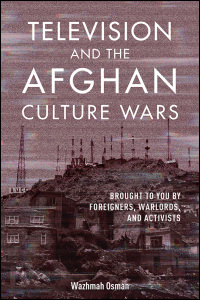Through this article, we examine the history and conventions of copaganda in the United States, and critically consider how HBO’s Watchmen has responded to and represented the historical relationship between policing and white supremacy. We argue that while Watchmen works to explicitly critique the history of white supremacist violence in US policing, the show reproduces several copaganda conventions. Watchmen depicts central law enforcement characters who commit violence as heroes, uplifts the main police character as an eventually almighty arbiter of justice, portrays white supremacist law enforcement characters as anomalous individual infiltrators (a.k.a. “bad apples”), and was created in collaboration with various members of law enforcement. After presenting this case study in contemporary copaganda, we consider how science fiction series can more meaningfully respond to the movement for police and prison abolition through representing abolitionist futures.
Keyword: television
Review of Television and the Afghan Culture Wars Brought to You by Foreigners, Warlords, and Activists by Wazhmah Osman (University of Illinois Press)
This review examines Wazhmah Osman’s book Television and the Afghan Culture Wars, an ethnographic study of television media in Afghanistan. The book explores the Afghan mediascape through richly detailed interviews with media industry professionals and local Afghans, which provide a realist portrayal of the perils and triumphs of media houses in Afghanistan, local cultural contestations, changing gender norms, and the role and reception of television in the nation’s rather tumultuous political and cultural life. Osman deflates the dominant notion in Western discourses of Afghanistan as a “hopeless landscape of powerless people,” (2) arguing that there is a thriving, internationally backed media infrastructure and a hopeful, culturally conscious citizenry in the nation. She argues that despite Afghanistan’s history of violence, ethnic tensions, atrocities against women, and imperialistic agendas by foreign powers, the Afghan media sector is a widely accessible platform for retribution against years of underdevelopment and war, with “the potential to underwrite democracy, national integration, and peace” (3).
Review of Global Entertainment Media: A Critical Introduction by Lee Artz (Blackwell)
Artz gives overwhelming evidence of how the cultural hegemony of individualism and consumerism is promoted everywhere by transnational media corporations (TNMCs), so that current social relations in capitalism are reproduced and reinforced. The reader can get a clear outlook of TNMCs and their impact on the diversity, hybridization, and standardization of global culture and outlooks.
Review of Speculative Blackness: The Future of Race in Science Fiction by André M. Carrington (University of Minnesota Press)
André Carrington’s ‘Speculative Blackness’ is a novel approach to the consumption of race representation in media. Carrington explores how Blackness is manufactured, consumed, and transformed through the speculative fiction genre across multiple 20th and 21st century mediums. Traditional media of comic books and television shows reveal the marginalized status of Black figures however, these media do not exist in a vacuum. The consumption of speculative fiction is a transformative process for the original content, which consequentially produces amateur media due to a long-established history of fan interaction. Black representation is characterized as the exception, not the rule, in traditional production, but fan consumption reconfigures these notions. Ultimately, Carrington’s work is an innovative dialogue regarding a genre that creates worlds speculating on what could be. Speculative fiction breaks down preexisting notions of our reality and creates worlds with entirely new expectations and interactions. With the creative liberty of the genre, Carrington casts Black representation as a consumed media but also an imaginative effort.



